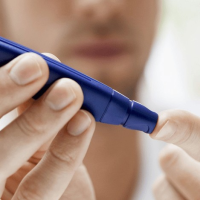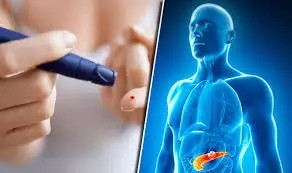CBD oil for diabetics - Everything you need to know
Author: Lucie Garabasova
Diabetes is a disease characterized by elevated blood sugar levels (hyperglycemia), which is affecting an increasing number of people in the Czech Republic. Many of them reach out to us for advice on whether CBD oil is suitable for diabetics and what they need to know about it. Therefore, we have compiled everything you should know about CBD before you start using it as a diabetic.
CBD, diabetes, and everything you need to know
Diabetes is a condition in which the body has difficulty regulating blood sugar levels. In healthy individuals, the pancreas produces a hormone called insulin, which helps transport glucose molecules across cell membranes and into cells for energy production.
In diabetics, depending on whether they have type 1 or type 2 diabetes, the body is either unable to produce insulin or cannot use it effectively enough to maintain glucose levels within a healthy range in the bloodstream.
In the case of type 1 diabetics (who make up only about 5% of the diabetic population), the body is unable to produce insulin, a key hormone needed to transfer glucose molecules from the bloodstream into cells. This is generally due to an autoimmune attack on the pancreas—the organ responsible for producing insulin. Type 1 diabetes usually develops in children or young adults who have contracted a virus that affects the pancreas, and apart from possible genetic predispositions, there are not many specific risk factors.
Type 2 diabetes is a more complex form of the disease, where the body still produces insulin, but either it doesn't produce enough, or the cells become resistant to its physiological pathways. In either case, the resulting effect is similar to that of type 1 diabetes, with the fundamental problem being the general inability to control blood glucose levels.
Type 2 diabetes is also a much more prevalent form of the disease; it is estimated to affect over 400 million people worldwide, accounting for 90 to 95% of the total diabetic population.
DID YOU KNOW: Type 2 diabetes affects over 400 million people worldwide?
CBD for diabetics - What research shows
Dr. Raphael Mechoulam, a researcher from the Hebrew University of Jerusalem, points out that naturally occurring CBD receptors are found throughout the human body—from the brain and nervous tissues to organs, endocrine glands, and immune cells.
One of the organs where he found these receptors to be particularly widespread is the pancreas.
In fact, endocannabinoid receptors (specifically CB-1 receptors) have been found specifically in the cells of the islets of Langerhans—the very site where insulin is produced. Moreover, it has been suggested that stimulation of these receptors in islet cells may be linked to insulin production.
Additionally, the National Organization for the Reform of Marijuana Laws (NORML) goes so far as to suggest that endocannabinoids may be "the most important physiological system involved in establishing and maintaining human health," due to their central role in regulating homeostasis, which is the body's ability to maintain normative operating conditions despite harmful stimuli.
Further studies on CBD and diabetes
Studies by a total of four researchers conducted between 2006 and 2013 indicate that CBD is beneficial in treating type 1 diabetes and combats complications associated with the disease, such as damage to blood vessels and veins.
Scientists at Hadassah University Hospital in Jerusalem investigated the effects of CBD on the development of type 1 diabetes in mice genetically predisposed to develop the disease. In so-called NOD mice, insulitis develops at 4 to 5 weeks of age, followed by diabetes at 14 weeks. Insulitis is an inflammation of the pancreatic cells that produce the hormone insulin, and type 1 diabetes arises as a result of the damage to these cells. NOD mice aged 6 to 12 months that received 10 to 20 injections of CBD daily (5 mg of CBD per kilogram of body weight) showed a significantly lower—30%—incidence of diabetes compared to untreated mice, where the incidence of type 1 diabetes was 86%.
In the sample of mice that developed diabetes despite CBD administration, the disease was significantly slowed. Blood levels of cytokines responsible for the spread of inflammation (IFN-gamma and IFN-alpha) are generally higher in NOD mice with a genetic predisposition to diabetes. When CBD was administered, the levels of both cytokines were significantly reduced (by more than 70%).
In another study with two samples of mice, where the first sample of five mice was without CBD and the second sample of five mice received CBD for 26 weeks, the following results were observed: in the first sample, diabetes developed in all five mice. In the second sample, which received CBD, diabetes developed in only two out of the five mice.
The researchers concluded that "CBD administration can prevent the development of type 1 diabetes" and potentially other autoimmune diseases. They also noted that many patients diagnosed with type 1 diabetes still have a sufficient number of insulin-producing cells at the time of diagnosis, making them suitable candidates for CBD therapy.
Other studies suggest that increased circulation of endocannabinoids in the body leads to altered vascular function, both negatively and positively, in type 2 diabetes and add that CBD may be beneficial by improving endothelial vasorelaxation—widening of blood vessels.
Furthermore, scientists suggest that CBD is useful in treating retinal damage caused by diabetes—diabetic retinopathy.
Another study published by researchers from the National Institutes of Health in Bethesda indicates that CBD alleviates cardiovascular problems, stress, inflammation, aging, and cell death caused by diabetic cardiomyopathy. The researchers concluded that these results, along with the safety and high tolerance of the human body to CBD, point to the high therapeutic potential of CBD for diabetic and cardiovascular diseases.
Can CBD help with the core symptoms of diabetes?
As you read in the studies above, yes, CBD can help with the core symptoms of diabetes. One of the most significant factors associated with the development of insulin resistance in type 2 diabetes is chronic inflammation related to obesity. The excessive presence of fatty tissue in obese type 2 diabetics drastically limits the efficiency of glucose metabolism, resulting in high blood sugar levels. However, the specific anti-inflammatory properties of CBD have long been known to directly combat glucose metabolism disorders and improve overall metabolism.
Nerve damage is another condition commonly associated with diabetes.
And finally, it's important to emphasize that CBD drops do not have a psychoactive effect—unlike whole-plant marijuana, they contain almost no THC, the cannabinoid responsible for the drug's psychoactive properties.
Final thoughts on CBD, diabetes, and future treatment possibilities
It's important to remember that not all tinctures are the same, and most importantly, every individual is unique—more on this in the article about why CBD oil may not work the same for everyone.
However, it has been proven that there is a "significant connection" between regular CBD use and better blood sugar levels.
Therefore, we recommend trying CBD oil and forming your own opinion :-)
Sources:
https://www.tandfonline.com/doi/abs/10.1080/08916930500356674
https://www.sciencedirect.com/science/article/abs/pii/S0014299913007310
https://www.ingentaconnect.com/content/ben/cppm/2009/00000007/00000003/art00007


